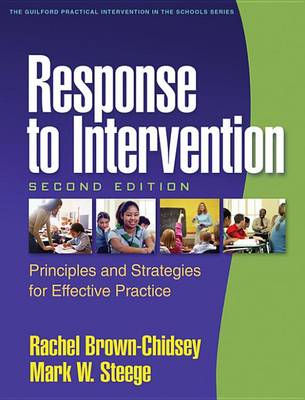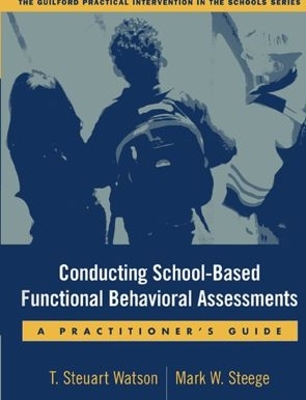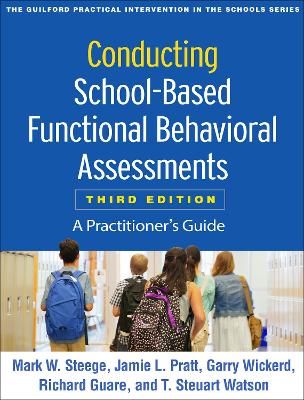Guilford Practical Intervention in the Schools
3 total works
Response to Intervention, Second Edition
by Rachel Brown-Chidsey and Mark W Steege
Meeting a key need, this is the first comprehensive guide to implementing a schoolwide response to intervention (RTI) program. The book is geared to helping practitioners understand and respond to No Child Left Behind and to the new special education eligibility guidelines outlined in IDEA 2004. Presented are the theoretical and empirical foundations of the approach and a clear, 10-step model for conducting RTI procedures with students, including those from diverse backgrounds, who are experiencing learning difficulties. Helpful reproducibles include 11 worksheets and more than two dozen overhead transparency masters, in a large-size format with lay-flat binding to facilitate photocopying.
Conducting School-Based Functional Behavioral Assessments, First Edition
by Mark W Steege and T. Steuart Watson
This indispensable manual takes school practitioners step by step through conducting functional behavioral assessments and using them to plan effective interventions. The authors present a cogent rationale for the use of functional behavioral assessment (FBA), clearly explaining its advantages over traditional approaches to dealing with problem behavior. Basic terms and procedures are defined and the process of working with individual students is described in depth. Bringing concepts to life with realistic case examples, the authors also include a variety of sample FBA reports and corresponding positive behavior support plans. A Q&A chapter offers straightforward answers to practitioners' frequently asked questions. Perhaps most important, the volume provides all of the tools needed to complete a reliable and valid FBA, including forms, questionnaires, and worksheets, conveniently designed in a ready-to-photocopy 8 1/2" x 11" format.
Conducting School-Based Functional Behavioral Assessments, Third Edition
by Mark W Steege, Jamie L. Pratt, Gary Wickerd, Richard Guare, and T. Steuart Watson
Widely recognized as a gold-standard resource, this authoritative book has been revised and expanded with 50% new material. It provides a complete introduction to functional behavioral assessment (FBA), complete with procedures, forms, and tools that have been piloted and refined in both general and special education settings. Numerous vivid examples illustrate how to use the authors' behavior-analytic problem-solving model (BAPS) to synthesize assessment results and guide the design of individually tailored interventions. Practitioners and students enjoy the engaging, conversational tone. In a convenient large-size format, the book includes 17 reproducible checklists and forms. Purchasers get access to a companion webpage where they can download and print the reproducible materials.
New to This Edition
*Revised BAPS model reflects the latest research and offers a more comprehensive approach to FBA.
*Chapters on professional and ethical standards; analyzing how biological/medical conditions, thoughts, and emotions influence behavior; and analyzing how executive skills deficits influence behavior.
*Chapters on testing hypotheses about the functions of problem behavior; testing reinforcer effectiveness; and evaluating function-based interventions.
*Chapter providing applied learning experiences for professionals and students.
*Most of the reproducible tools are new or revised.
This book is in The Guilford Practical Intervention in the Schools Series, edited by Sandra M. Chafouleas.


